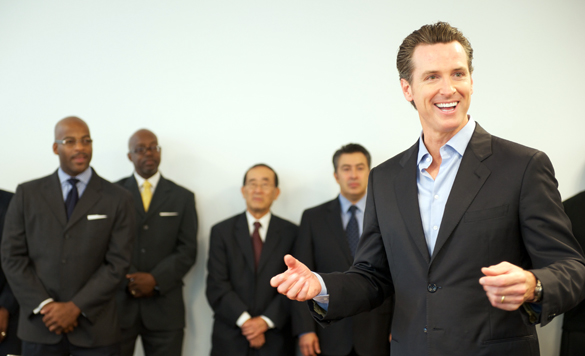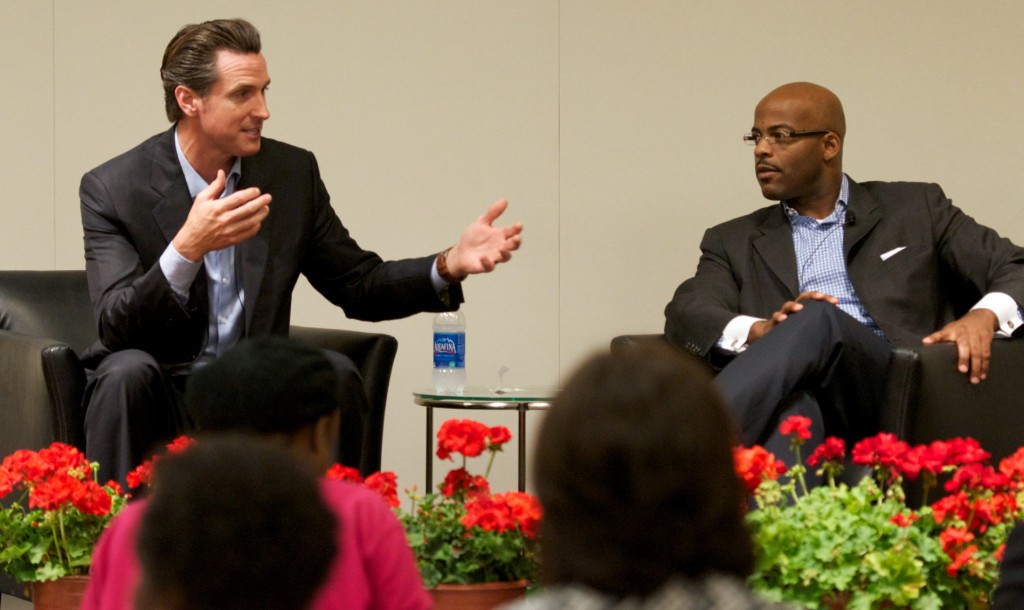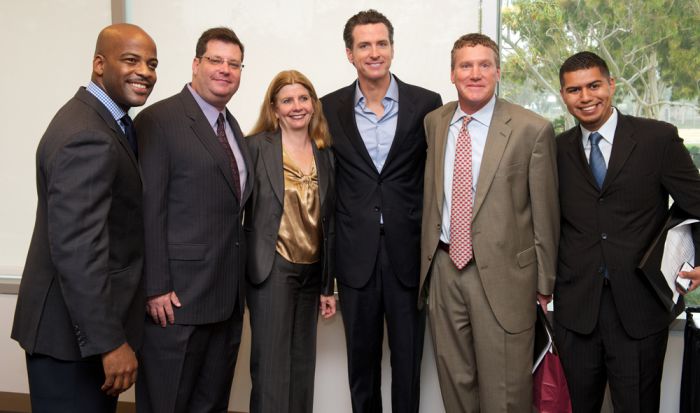On Oct. 19, politicians and community business leaders sat down to breakfast at California State University, Dominguez Hills to talk about economy recovery and job growth. Hosted by Assemblyman Isadore Hall, III (52nd Dist.). the Business 2 Business Roundtable featured a keynote address by Lt. Gov. Gavin Newsom.
“As the topic of job creation continues to make headline throughout the nation, having Lt. Gov. Newsom on campus to discuss ways our state can reinvent itself as innovators and leaders by enhancing research at state universities showed his commitment to higher education,” said David Gamboa, director of Government and Community Relations at CSU Dominguez Hills.

Newsom addressed the audience with the need for California to meet and surpass the challenges of rapid global growth. He cited the “hyper-connectivity” of a new global economy saying, “it’s leaving people behind to a degree that we never could have imagined 20 years ago, 10 years ago – for that matter, even five years ago.”
The lieutenant governor spoke about higher education as a “conveyor belt” that produces a qualified workforce for the state’s most innovative fields, including science and technology. He cited budget cuts to higher education – $650 million to the CSU, $650 to the UC system, and half a million to community colleges – as “beyond extraordinary” and the role of the CSU as critical to the state’s former economic prowess.
“What took half a century to build here can be cut down in just a few years if you don’t have a plan for cuts,” Newsom said. “At a time when [President Obama] wisely says, ‘if you are not out educating, you cannot compete,’ here we are cutting that off to hundreds of thousands of people who cannot afford it. This university was founded at the height of California’s growth, at a time when we were the job creator in the nation. In 1960 when Pat Brown made the commitment to this university, this state was growing at an annual rate of about 3.7 percent in terms of annual job production…. There was no other state in the nation that grew in any comparable way.”

Newsom maintained that the challenge to California is not just about getting the economy back to where it was before the 2006 evidence of recession in the state.
“It’s about getting back to where we were 30 years ago when we were the envy of our nation,” he said. “California has not been a state about being average. This is a state of dreamers, doers, entrepreneurs, and innovators that has long prided itself on being on the leading and cutting edge of new ideas. We’re the birthplace of life sciences and biotech. We still have three of the top 10 universities on the planet. More Nobel laureates, more engineers, more scientists, more researchers are in this state than any [other] in our nation. It’s not about being average – this state is about greatness.”
Newsom said that with a $1.9 trillion economy, California still ranks as one of the world’s largest. He said that “being graded on a global curve” necessitates being able to compete with not just cheap labor from overseas, but “cheap genius” as Americans and Californians are “out-educated” by workers from around the world.
“The top performing school district on the planet is in Shanghai,” he said, contining, “Finland, South Korea, I could go down the list and I could give you dozens of countries before I get to the United States of America.
“We’ve dropped to 18th in port infrastructure in the world, we’re 22nd in rail, we’re 32nd in air transport, 15th in broadband. That’s just access. We’re down to about 27th when it comes to speed. We were number one about a decade ago in all those categories. That used to be us. This is serious. Average is over.”

Newsom gave examples of other states and countries who are actively restoring their economies, including the state of Bavaria in Germany.
“They have dramatically increased their exports and they have brought manufacturing back,” he said. “Why does manufacturing matter? Because the middle class matters; because it is the foundation of any vibrant democracy.”
“The growing income inequality in this state and in this country that is so alarming, that is manifesting itself in ‘Occupy This,’ ‘Occupy That,’ and it’s occupied our consciousness, particularly when California now has more people living below the poverty line than the populations of 33 states.”
Newsom acknowledged that while the jobs may be out there – he said that there are approximately 537,000 jobs currently available in California – the educational shortfall, particularly in technology, has affected the ability of Californians to acquire those jobs. He advocated for a different approach that focuses on non-partisan interests.
“We’ve got to do things dramatically differently,” he said. “I care too much about this state to focus on solvency. I want to focus on greatness.
“We’re all in this together. We’re going to change things in this state, we need collective action. There’s no Democratic plan, there’s no Republican plan. There is a jobs plan. One thing I’ve learned in my 17 years in [public] office – when I wanted to move fast I moved alone. But when I wanted to move far, I moved together.”